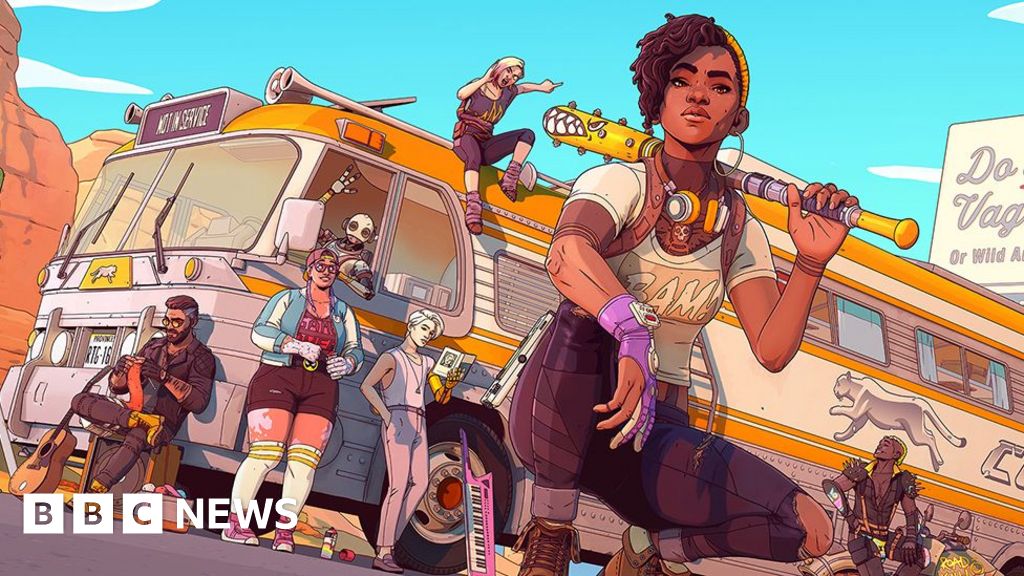Image source, Dominique Tipper
- Author, Tom Richardson
- Role, BBC Newsbeat
A video game set in a divided America, starring a cast of diverse characters, was always going to cause unrest.
But Dominique Tipper likes a challenge.
The actress is best known for her work on The Expanse, a popular science fiction show that ran for six seasons on the American network SyFy.
More recently, she was in New York, performing in a production of Grenfell: A Survivor’s Story.
Her next project is Dustborn, a comic book-inspired video game set in a dystopian US run by an authoritarian force known as Justice.
Dominique voices Pax, the leader of a group of ‘anomals’: people who can weaponize words through superpower-style abilities.
The heroes must transport a stolen package and pretend to be a punk band. They go on a road trip through North America, on the run from Justice and the owners of the package.
Dominique describes the group as Pax’s “found family” and says “as the game progresses, you develop a kind of relationship with them”.
“I think she is also looking for a better life for herself, and also wants to know more about who she is,” says Dominique.
“She’s a pretty fantastic, flawed character.”
Image source, Red thread games
Previews of Dustborn have praised its cartoonish visuals and gameplay that mixes different genres.
Characters are the core of the game and the diverse main cast has attracted quite a bit of attention.
It includes Pax’s lover Noam, who uses gender-neutral pronouns, Sai, a Muslim, and Pax’s younger sister Ziggy, who deals with anxiety and hyperactivity.
When it was first revealed, Dustborn faced negative feedback from those who believe developers are being pressured to make their games more diverse.
Ragnar Tørnquist, creative director at developer Red Thread Games, emphasizes that this is not the case.
“I think publishers and developers are increasingly understanding that there is a broader and more diverse audience out there,” he says.
“Games are becoming more global, games are becoming more accessible to everyone.
“And that means the audience is changing.”
Ragnar says he understands why people might turn away, “especially if you’re the kind of player who’s used to seeing yourself on screen.”
But he says there’s room for games with casts, stories and perspectives we’re less used to seeing.
“We’re just making one game that will hopefully find an audience.
“Maybe it’s a different audience, and I think we can afford to be different,” he says.
Image source, Ragnar Tornquist
Dominique says she’s not a fan of “buzzwords and phrases” related to representation, but there is some truth behind them.
“I don’t think there’s anything like seeing yourself on screen or in a game if you’ve never seen it before,” she says.
Dominique says she was drawn to Dustborn because the characters were “multi-layered”, and Ragnar says the developers wanted to “create a cast that feels like a representation of the world as it is now”.
He admits that his team, based in Norway, is largely made up of people who look like him.
So Ragnar says they’ve “leveraged the cast” and found writers “more representative of the characters in the game.”
“We think it’s more interesting, it’s the right thing to do,” he says.
“And I think the stories that come out of it are also more original and interesting.”
Image source, Red thread games
From her experience in various sectors, Dominique believes that there are deep-rooted problems that lead to reactions that cannot be solved overnight.
“I think we can continue to make art that counteracts that,” she says.
‘Because it can change people’s attitudes on a social level.
“And I think this can then lead to changing things on a systemic level.”
Ragnar says he would like to see more support for developers from underrepresented backgrounds “to really see a change in the stories that games can tell.”
“I think if you embrace it, both from the development side and from the player side, it can be game-changing,” he says.
“I think we’re just at the beginning of allowing games to push boundaries, whether they’re cultural, political or social. Just being able to see the world from different perspectives.”
Ragnar accepts that Dustborn may not be a hit with everyone who plays it.
“I mean, that’s fine. It’s just an emotional response. That’s what I really care about, whether it’s positive or critical,” he says.
“It’s fine as long as it’s an emotional response, as long as this game has an impact and means something to people.”
Dominique, on the other hand, says she doesn’t deal with negativity when it comes up.
“To be honest, I don’t really support that,” she says.
“If you all want to hit me up and do some of that nonsense, go ahead and try it.
Listen to Newsbeat live at 12:45 and 17:45 on weekdays – or listen back here.
